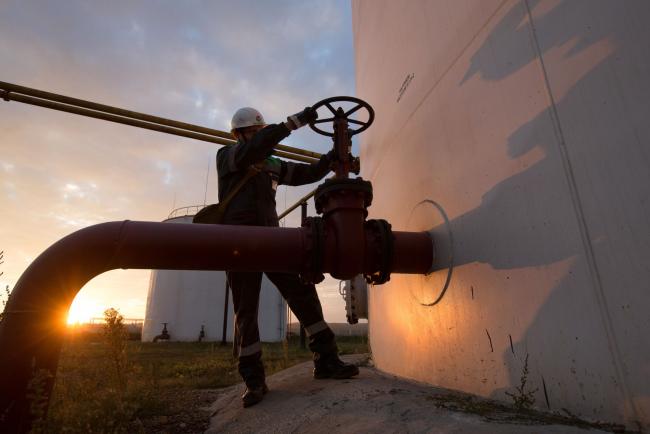(Bloomberg) -- Oil slipped after rallying almost 8% in three days as investors weighed mixed signals from the White House on Iran and signs that an extension of the OPEC+ production cuts may not be a fait accompli.
Futures in New York fell after closing up 0.8% on Monday. President Donald Trump imposed sanctions on Iran’s supreme leader, Ayatollah Ali Khamenei, Monday, while also asking in a tweet why the U.S. is protecting the Strait of Hormuz, the world’s most important oil choke-point. Russia suggested it’s taking wait-and-see approach on the OPEC+ output deal before the G-20 summit in Japan at which Trump will meet with Chinese President Xi Jinping.
Oil has jumped about 13% since mid-June as rising tension between the U.S. and Iran spurred concern there could be disruptions to global energy flows or even outright war. That reversed a decline driven by an escalation in the trade conflict between Washington and Beijing. The Trump-Xi meeting this week and the gathering of the Organization of Petroleum Exporting Countries and allied producers days later in Vienna may provide fresh direction for the market.
“Investors are taking a wait-and-see stance, as it’s not certain how things will go at the G-20 summit,” said Jun Inoue, a senior economist at Mizuho Research Institute Ltd. in Tokyo. “Concern over the economic slowdown means WTI oil prices aren’t likely to rise to $65, or even $60, unless there’s a rapid escalation of tensions in the Middle East or major progress in the trade talks.”
West Texas Intermediate for August delivery fell 60 cents, or 1%, to $57.30 a barrel on the New York Mercantile Exchange as of 11:20 a.m. in Singapore. The contract has rallied 7.7% over the previous three sessions.
Brent for August settlement lost 61 cents to $64.25 a barrel on London’s ICE (NYSE:ICE) Futures Europe Exchange. It dropped 34 cents, or 0.5%, on Monday. The benchmark crude contract traded at a premium of $6.96 to WTI.
See also: Oil’s Outlook Could Be Even Bleaker Than Expected: Here’s Why
Trump told reporters at the White House that the penalties would deny financial resources to Khamenei who is the one ultimately “responsible for the hostile conduct of the regime.” The move could toughen Khamenei’s attitude toward talks with the U.S. government, Mizuho’s Inoue said.
Russia’s Energy Minister Alexander Novak said “we need to wait until the G-20 leaders’ meeting” in Japan this week and see “how the economic situation will develop.” Kazakhstan and Azerbaijan said that recent market data show there is a need to prolong the OPEC+ supply agreement. Saudi Arabia indicated earlier this month that it was sure the coalition will extend production cuts.
